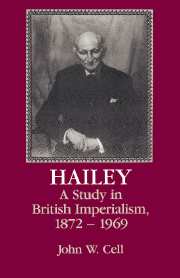Book contents
- Frontmatter
- Contents
- List of abbreviations
- Glossary of foreign words
- Preface
- 1 Early life
- 2 Colonization officer, 1901–1906
- 3 From Sargodha to Delhi, 1907–1912
- 4 Chief commissioner of Delhi, 1912–1918
- 5 A report on the Punjab
- 6 Finance member, 1919–1922
- 7 Home member, 1922–1924
- 8 Governor of the Punjab: the Sikhs, 1924–1925
- 9 Governor of the Punjab: the communal problem, 1924–1926
- 10 Governor of the Punjab: the communal problem, 1927–1928
- 11 Governor of the United Provinces, 1928–1930
- 12 Governor of the United Provinces: civil disobedience and Round Table Conference, 1930–1931
- 13 Governor of the United Provinces: 1931, year of crisis
- 14 Governor of the United Provinces: winding down, 1932–1934
- 15 Surveyor of Africa, 1935–1939
- 16 Two missions to Africa, 1939–1940
- 17 A report and a vision, 1941–1942
- 18 Adviser and propagandist, 1942–1945
- 19 Indian partition and the onset of African decolonization, 1945–1949
- 20 Defender of the faith, 1949–1969
- Bibliography
- Index
7 - Home member, 1922–1924
Published online by Cambridge University Press: 12 October 2009
- Frontmatter
- Contents
- List of abbreviations
- Glossary of foreign words
- Preface
- 1 Early life
- 2 Colonization officer, 1901–1906
- 3 From Sargodha to Delhi, 1907–1912
- 4 Chief commissioner of Delhi, 1912–1918
- 5 A report on the Punjab
- 6 Finance member, 1919–1922
- 7 Home member, 1922–1924
- 8 Governor of the Punjab: the Sikhs, 1924–1925
- 9 Governor of the Punjab: the communal problem, 1924–1926
- 10 Governor of the Punjab: the communal problem, 1927–1928
- 11 Governor of the United Provinces, 1928–1930
- 12 Governor of the United Provinces: civil disobedience and Round Table Conference, 1930–1931
- 13 Governor of the United Provinces: 1931, year of crisis
- 14 Governor of the United Provinces: winding down, 1932–1934
- 15 Surveyor of Africa, 1935–1939
- 16 Two missions to Africa, 1939–1940
- 17 A report and a vision, 1941–1942
- 18 Adviser and propagandist, 1942–1945
- 19 Indian partition and the onset of African decolonization, 1945–1949
- 20 Defender of the faith, 1949–1969
- Bibliography
- Index
Summary
At the end of May 1922 Sir Malcolm and Alexandra Hailey arrived in London for a three-month leave, his first trip home since before the war. Apart from visiting family and fishing he had interviews with the king, the Prince of Wales, and the prime minister, David Lloyd George. He also wrote an article on Indian affairs, published anonymously in Round Table.
Since 1895, his first year in India, Hailey began the article, there had been four intense political spasms: the first, centered in the Deccan, ending in the conviction of B. G. Tilak for sedition in 1897; the second, also focused in the west, with a secondary wave in the Punjab, terminating in Tilak's second imprisonment in 1907; third, the long conflict over the partition of Bengal; and last, Gandhi's recently concluded noncooperation campaign. Each convulsion had similar features: “its intensity, its revolutionary, not to say its anarchical character; the suddenness with which it has subsided – at all events temporarily – as soon as the principal protagonist or protagonists were deprived of the power to lead the agitation; and the almost baffling apathy of the reaction period.”
Thus did Indian political history repeat itself. Readers would find it hard to identify the country of the summer of 1922 with the scene even as recently as the previous February.
- Type
- Chapter
- Information
- HaileyA Study in British Imperialism, 1872–1969, pp. 92 - 106Publisher: Cambridge University PressPrint publication year: 1992



